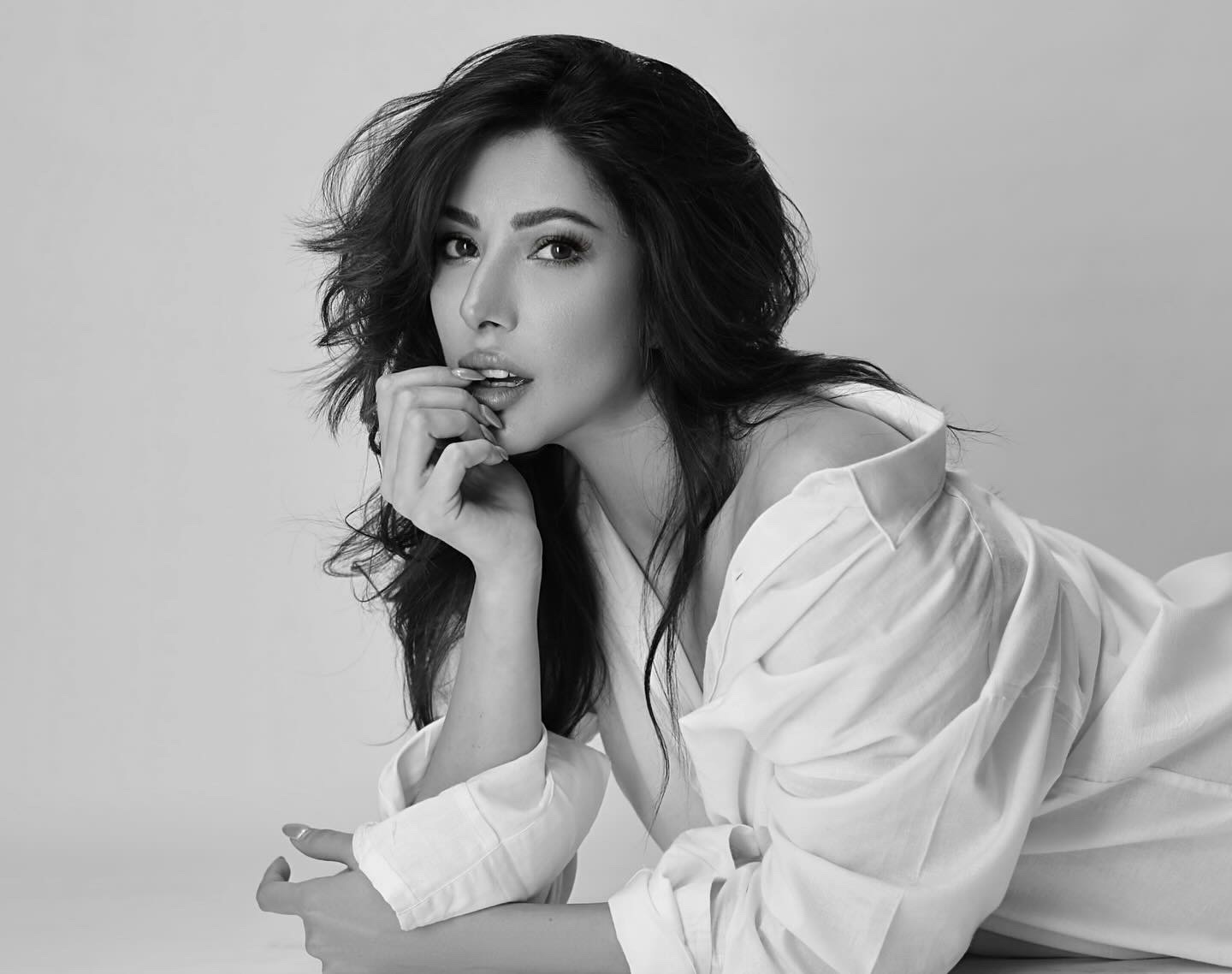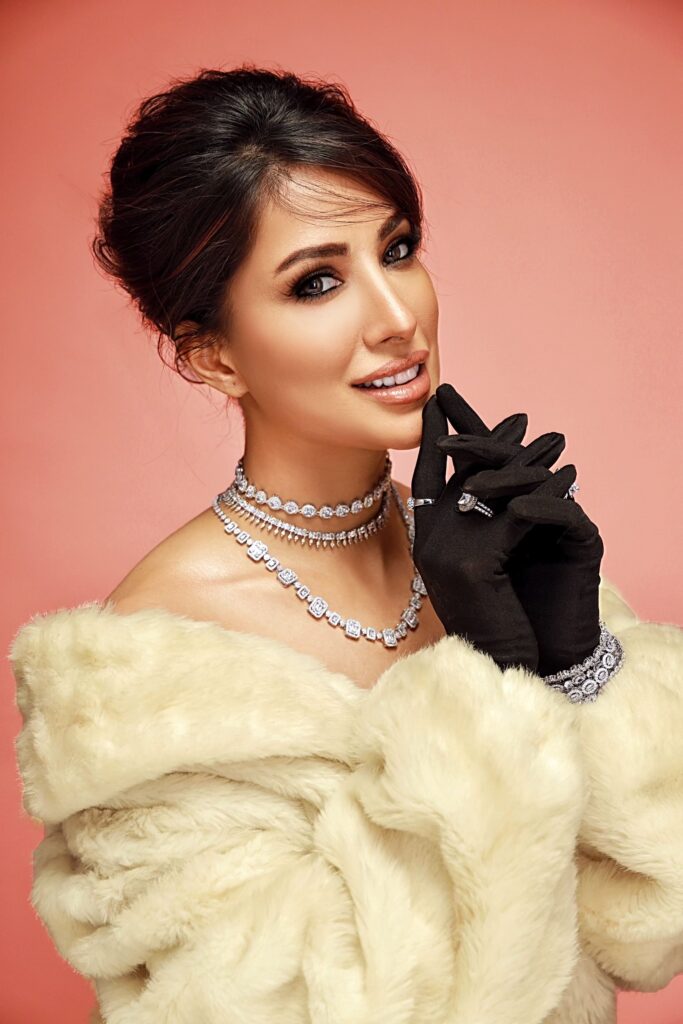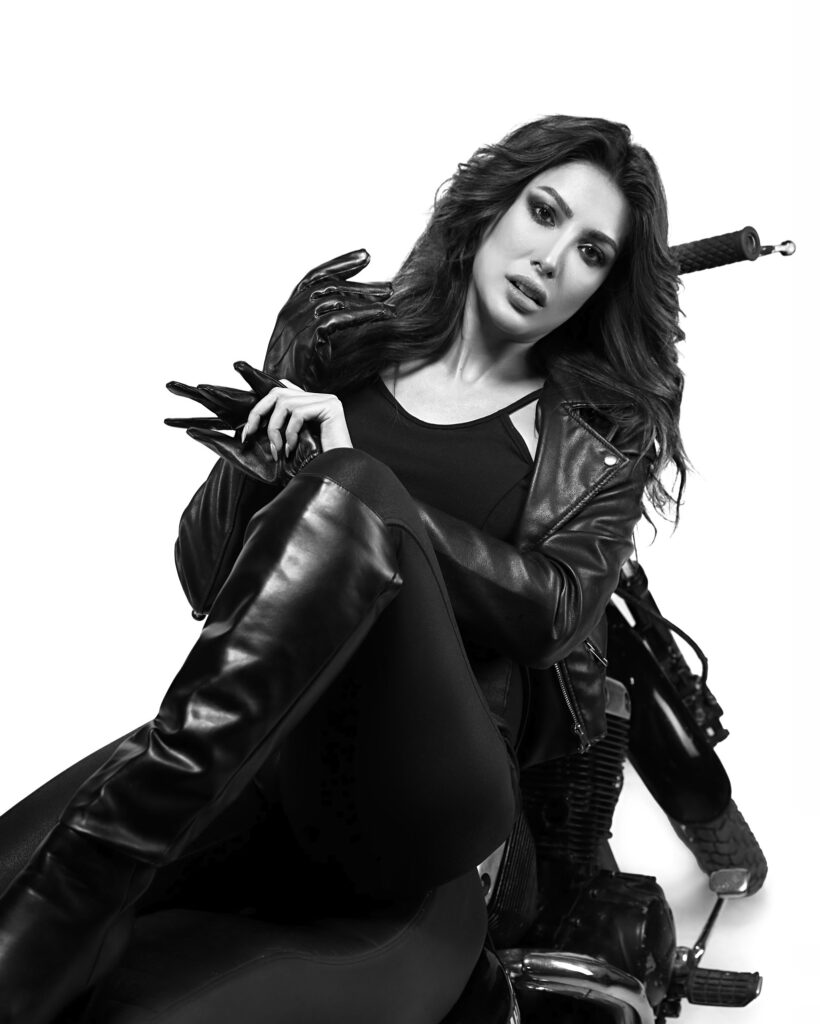Cover story
Mehwish Hayat: A Superstar with a Mission

By Zurain Imam
Mehwish Hayat is arguably one of Pakistan’s most talented, versatile and internationally celebrated superstar. About four years ago at a British High Commission James Bond themed gala party I was sitting alone by myself feeling lost, still reeling from my mother’s recent passing away when Mehwish noticed me sulking and left the dance floor to ask me to waltz with her. I was indubitably and forever touched.
We meet at Hum TV Network headquarters amidst a flurry of activity with journalists, influencers et al vying for Mehwish and her Daghabaaz Dil co-star Ali Rehman Khan’s’s attention during their promotion for the movie. Directed by Wajahat Rauf, Daghabaaz Dil was the only Pakistani film that was released on Eid Al-Fitr holidays. Apart from Mehwish and Ali, who played the male lead, the film also featured veteran actor Saleem Shaikh and popular Internet personality Momin Saqib in prominent roles. “There was some element of supernatural stuff happening around me in the movie and at some point I get possessed in the movie. In our culture, we keep hearing these haunted stories about jinns which we are very fascinated about. So for me, it was just based on my observation as an actress and how well I could do it.”
Mehwish says it was the same type of preparation involved when she worked with Wahaj (Ali) for the first time in director Nabeel Baig’s ‘Ek Sau Taeeswan‘ part of the ‘Teri Meri Kahaniyan’ trilogy, her first comeback into films after a long hiatus.

Mehwish remains a stalwart figure in Pakistan’s entertainment industry who has made an indelible mark with her acting prowess in several blockbuster films that have all been hits: one of the only Pakistani actresses to achieve this feat.
” It was my first time working with Wahaj and his cinematic debut,” Mehwish says. “In fact, I had never met him before. I had only seen some of his work on TV. But even then, the chemistry was good and what really helped in that case was that we did a lot of rehearsals before going on the shoot.”
Mehwish remains a stalwart figure in Pakistan’s entertainment industry who has made an indelible mark with her acting prowess in several blockbuster films that have all been hits: one of the only Pakistani actresses to achieve this feat. So where did Mehwish’s journey begin? Born on January 6, 1988, in Karachi, 36 year-old Capricorn Mehwish belongs to a family teeming with artistic creativity.
“Acting was always my first love,” Mehwish says. “But the singing comes from the fact that my siblings are into music and are accomplished singers and musicians. Ever since I was a child, I was always surrounded by music and I would sing along with my brother and sister. I had the most wonderful childhood! Usually kids grow up and think, ‘Oh, we wish we had this or that’ growing up. My mother always made sure that I got the best education and the best and latest toys.”
Mehwish attended Karachi University and received a Bachelor’s in Arts.
” I was a geek and wanted to become an engineer, but then I started acting early because of my mother. I did a couple of guest appearances when I accompanied Ami to the PTV studios. I would just lose myself into the whole magical world of sets and TV work. The acting bug was definitely there.” Mehwish’s father did not discourage her to act.
“He just wanted to ensure that I received good education and that I didn’t quit studying. I got my degree just because my father wouldn’t allow otherwise.”
Later after dabbling in modelling and appearing in various commercials and fashion shows, Mehwish’s breakthrough role came in 2012 with the hit drama serial ‘Meri Behen Maya’ in which she sang the title song. The 2012 romantic drama series Meray Qatil Meray Dildar however marked a significant turning point in Mehwish’s career, earning her praise and a nomination for Best Actress at the Lux Style Awards. Then there was Anjum Shahzad’s highly successful family drama Kabhi Kabhi (2013) that also did really well alongside ‘Man Jali’ (with Mikaal Zulfiqar) and Momina Duraid’s ‘Mirat-ul-Uroos’ (with Ahsan Khan, Aamina Sheikh and Mikaal Zulfiqar).” Mehwish had earlier acted in three other dramas of Momina Duraid including Phir Chand Pe Dastak (2011), Ishq Mein Teray (2013) and Ru Baru (2014).
“There was also Kashif Nisar’s acclaimed series ‘Kami Reh Gahi’ (2013) where I portray a strong-headed woman in which I acted alongside Noman Ijaz. For me to be working with such an iconic actor at that age – I was in my early 20s- was special. All these projects really posited me as an upcoming actress ‘who has it all’ or that’s what they used to say about me. And now here we are.”

Mehwish admits she garnered major attention from her ‘item number’ ‘Billi’ from the 2014 blockbuster film ‘Na Maloom Afraad.’ At that time, in India, a lot of item numbers were becoming popular,” Mehwish reminisces. Does she think the term, ‘item number’ is derogatory?
“It’s a bad term. All the old Pakistani movies had one song with Madame Noor Jehan’s vocals, with songs like ‘Jawaani Meri’ ‘Bijli’, ‘Tufaan’ and the ilk. At that time, no one said anything or called them ‘item numbers’ or complained about them. There was an audience at that time, too, for these kind of films and songs. The term ‘item number’ emanates from Bollywood and some Pakistanis have a negative reaction to the way they present those songs. But then again, it was just 10 per cent of the populace who had an issue. The rest still remember ‘Billi.‘ It’s the most iconic song ever which launched my movie career.”
After making her debut with the hit comedy film ‘Jawani Phir Nahi Ani’ (2015) in 2016, she starred in the blockbuster movie ‘Actor in Law’ opposite Fahad Mustafa. Her performance as a strong and independent woman resonated with audiences, and she won the Lux Style Award for Best Actress.
Mehwish later starred in comedies Punjab Nahi Jaungi (2017), Load Wedding (2018) Chhalawa, (2019) and London Nahi Jaunga (2022) all of which rank among one of highest-grossing Pakistani films.
Mehwish is renowned for her advocacy of significant social causes and is a dedicated philanthropist who has been involved in various charitable initiatives, including supporting education and healthcare and advocating for women’s rights and gender equality.
What is the main criteria for Mehwish to accept TV roles? Does she see acting on TV as a downer from being a movie star? “I’m very picky about any work that I do whether it’s a TV drama, a TV commercial or a film. I don’t see acting on TV as a downer, not at all. Basically, our dramas are world famous which has been a constant for us, while our movie and music industries collapsed at one point.
The reason she was not doing dramas was because every year she was doing a movie. “And I like to focus on one project at a time. It’s a very Capricornian trait. I can’t be pulled in different directions because then I lose track and focus. But I went back and did the movie ‘Dillagi’ (2016) with Humayun Saeed again after a long break, because I had not been able to find the right kind of TV script or the right kind of character,” Mehwish adds.
What type of roles excite Mehwish? “Challenging roles that I’ve not done before!” Her favourite directors are Nadeem Baig and Nabeel. As far as co-stars go, everyone she has worked with have been amazing and wonderful and she loves them all, she emphasizes.
Any early acting inspirations, any actress that Mehwish has admired? She emphasises that every senior actress has been nice to her, especially Javeria Abbasi who was like a big sister on the set and taught her a lot. “I’m thankful to her that whenever I worked with her on any project, she would just take me under her wing and give me these tiny tips that no actor gives you. In addition, I learned a lot working with Sajid Hassan and Abid Ali sahib (may he rest in peace) was an amazing director and co-actor to work with.”
Mehwish also recently acted in an RT telefilm, ‘Ijazat’ with her close friend, globetrotting couturier Hassan Sheheryar Yasin (HSY) after an absence of seven long years from TV when she last starred in ‘Dil Lagi’ with Humayun Saeed. ‘Ijazat’ was written by veteran novelist and screenwriter Faiza Iftikhar and directed by Ahmed Bhatti.
So, what is Mehwish’s opinion about models, singers, designers, influencers, make-up artists and even journalists getting into acting and does she think that undermines the craft of acting. “That’s an interesting and good question,” Mehwish muses. “There have been times when somebody was a singer, and they made an appearance in a drama and was not good at it. They’re just doing it till they find another alternative to survive. But a lot of singers have acted and some of them are phenomenal. like Junaid Khan and Farhan Saeed. We have all these examples of singers coming into acting and doing well. Also, designers like Deepak Perwani who are amazing because they have that X factor, that kind of ability to perform and act. Not everyone can be an actor and not everybody can be a singer either.
Given her family’s immersion in music, Mehwish herself is an accomplished singer and appeared on Coke Studio Season 9 in 2017 singing the duet ‘Tu Hi Tu’ with Shiraz Uppal. Recently she announced her inaugural collaboration with Bollywood rapper Yo Yo Honey Singh – news that stirred excitement within both Pakistan and India’s music spheres. She posted a photo of the two of them and wrote: “Teamed up with my favourite desi kalakaar, Yo Yo Honey Singh, on an electrifying new track ‘Noorani.’
Very few Pakistani stars are vocal about the equitable representation of Muslims in Bollywood and Hollywood. Mehwish has leveraged her powerful platform and made headlines for being the first major star to condemn problematic depictions of Muslims and Pakistanis in both Hollywood and Bollywood films.
Does Mehwish see any change, any improvement and does she think there’s going to be any interaction between Indian and Pakistani talent in the future? “For the longest time, I’ve been speaking about this issue on every platform and on every stage, wherever I have gone international about how Muslims and Pakistanis have been misunderstood and misrepresented as just one kind of people. Either terrorists; troublemakers or the ones who are very conservative. Being both a Pakistani and a Muslim this is something that I don’t relate with, whether in the West or in Bollywood. I also had objection to the fact that if there would be a role of a Pakistani or Muslim it would be played by someone who is neither. Why was a Pakistani not playing a Pakistani role? Now there are so many projects where this is happening like ‘Miss Marvel’, “Mehwish glows.
In 2022 Mehwish had a supporting role in the Marvel Cinematic Universe TV series Ms. Marvel, as the character Aisha, who has to flee India to Pakistan during the 1940s. “Miss Marvel really made me feel like the change was achievable. Miss Marvel being the first Muslim superhero in the whole Marvel Cinematic Universe was a huge breakthrough especially with its Pakistani director, Sharmin Obaid Chinoy, a woman leading a woman-based story with other Pakistani actors in it,” Mehwish enthuses. That’s why I came up with this Pink Llama production company. We needed to take matters into our hands.”
What was the impetus and genesis about the UK-based production company Pink Llama? Mehwish explains she founded the company to back bold nuanced narratives from underrepresented communities resonating globally. As a producer, Mehwish says she relishes the chance to break out of her country’s bubble and collaborate with daring voices from overlooked backgrounds worldwide. “The local industry caters too narrowly to domestic sensibilities rather than embracing stories with universal appeal,” she stresses. “Pakistani filmmakers should remove their self-imposed blinkers, collaborate across borders and make content about Pakistan rather than just for Pakistanis.”
Mehwish envisions Pakistani cinema capturing the same worldwide acclaim that the country’s vibrant music has achieved. She points to South Korea’s film industry as an inspiration for how creative hubs can transition from regional recognition to exporting culture globally.
She says she may direct in future, but her current priority is developing the promising Pink Llama slate showcasing the richness of under-heard perspectives. “I believe that we in the film industry carry a tremendous responsibility. Cinema is a very powerful tool. It can change people’s behaviours and attitudes.” About refusing offers from Bollywood Mehwish ripostes, “I have countless opportunities here in Pakistan. I have been part of the revival of Pakistani cinema and received immense respect and love in my own country.”
Mehwish has received numerous awards and nominations for her outstanding performances. Some of her notable awards include Lux Style Award for Best Actress (2017); Hum Award for Best Actress (2018) and Pakistan International Film Festival Award for Best Actress (2018)
In 2019, Mehwish was honoured by the President of Pakistan for her trailblazing acting career and contributions to the arts with the fourth highest civilian award Tamgha-e-Imtiaz.
In the same year, The Muslim Vibe recognised her as one of the Top Five Most Influential Muslim Women in the World. She was recognised by the Prime Minister of Norway in a prestigious ceremony in Oslo where she was bestowed with the Pride of Performance.
Mehwish Hayat added another feather to her cap by bagging the Best Actress award for her remarkable performance in the movie London Nahi Jaunga at the International Pakistan Prestige Awards (IPPA) held in Manchester in 2023.
Mehwish is renowned for her advocacy of significant social causes and is a dedicated philanthropist who has been involved in various charitable initiatives, including supporting education and healthcare and advocating for women’s rights and gender equality.

At IPPA Mehwish delivered a powerful and heartfelt acceptance speech which was dedicated to stopping the genocide in Gaza and a tribute to mothers which resonated with fans and the audience alike. In an Instagram video, Mehwish chose to shed light on the ongoing atrocities in Gaza and spoke of the plight of mothers losing their children.
Although Mehwish has been blessed with accolades, this has not come without some sort of acrimonious backlash. When she received the prestigious Tamgha-e-Imtiaz on Pakistan Day, March 23, 2019, for her contribution to Pakistani cinema, she immediately received negative publicity. She took to social media with an Instagram post to respond to online trolls who questioned her morals and character. “You are given an award that has been bestowed to our legends and heroes in the past. But the very fact that I could have received that honour because of my contribution to Pakistani Cinema and Art was overlooked. It was assumed that I slept my way to the award. I had to stand up and fight for it because that is one thing that I can’t take. Nobody can question my credibility and my character.”
Mehwish goes on to explain the machinations of the entertainment industry that oftentimes render it an ill repute. “What happens is, we belong to a very glamorous industry and we sometimes have to show some skin for some character that we’re playing, for example in the song sequence ‘Billi’. I had to dance because I’m an actress and that’s a role. We as artists are very emotional and sensitive people and work under extreme conditions enduring strenuous working hours. No matter how you’re feeling inside, you have to play a role and put up a brave face and that is not easy. The assumption that we have given up on our values and forsaken our morals really must change.”
Mehwish explains how she handles the pressures and expectations that come with fame. “It can definitely be challenging but it’s important to remember to prioritize your mental and emotional well-being.” The one thing that keeps her going on difficult days is her unwavering faith in Allah. She reveals honestly that most people fear her but makes it clear that behind her seemingly intimidating façade, lies a woman who is indubitably down-to-earth.
When it comes to romance do looks matter to her? “Good looks don’t matter; personality matters,” she asserts. Her criterion for a potential partner includes someone who is kind and cultured with a good sense of humour. “I’m a very serious person, so I want someone who can constantly make me laugh to strike that balance,”.
But one close and sure-fire relationship Mehwish has is with her brother Danish, who is a few years senior to her; a special bond which is often highlighted on social media. “He’s my best friend. closest confidant and steadfast ally. Our childhood squabbles evolved into a profound understanding and camaraderie in adulthood. That is why we also work together as he manages my affairs.”
And finally how would Mehwish describe her relationship and history with Hum TV? “Early on I acted in four or five plays for Hum TV. I’ve always had a wonderful experience working with them under their banner and umbrella, especially, ‘Meray Qatil, Meray Dildar’. It was such an iconic role for me to play. That was the beginning of my career.” As Mehwish Hayat celebrates her well-deserved recognition and accolades, she eschews basking in the glory of her own achievements. Her stolid advocacy and clear hawk-eyed vision for Pakistani dramas and cinema, coupled with her own stellar performances both in TV and Film, reaffirms her status as a revered artist with an ongoing and unwavering purpose.
